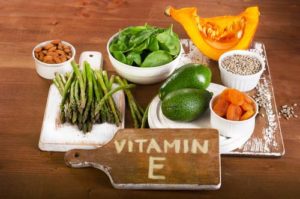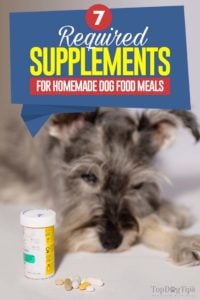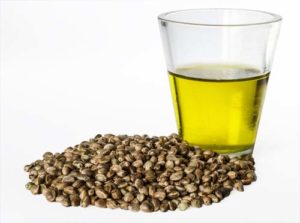Table of Contents
A healthy homemade dog food diet doesn’t mean including meat and veggies alone, even if most online recipes focus on that.
Depending on several factors, you’ll need to add several essential dog food supplements to your pet's dish to make a well-balanced homemade meal.
These dog supplements' exact types and dosage should be determined based on your dog’s breed, sex, age, physical condition, activity levels, and current (or potential) diseases and illnesses.
Samantha has covered this in more depth in her guide/video. You should always consult with your veterinarian or canine nutritionist before adding anything to your dog’s food.
With that in mind, several popular dog supplements are most commonly added to homemade dog foods, which we're going to discuss below.
7 Essential Homemade Dog Food Supplements
 Vitamin E
Vitamin E
Vitamin E is essential for dogs, and its deficiency is very common in canines. Studies show that adding Vitamin E to the dog's diet can improve the pet's coat and allergy factors, among other health issues (1, 2).
How much of it you need to add to your homemade dog food meals depends on multiple factors, including whether you add fish oil or plant oil to the dish.
Additionally, you can find a lot of different recommendations online regarding the amount of Vitamin E that needs to be added to your dog’s food.
In general, veterinarian sources say that you need to give 100 IUs to small dogs, 200 IUs to medium-sized dogs, and ~400 IUs to larger breeds.
At the same time, however, overdoing it with Vitamin E can lead to overdosing, which can turn it from an anti-oxidant into a pro-oxidant.
Other specialists recommend 1-2 UIs of Vitamin E per pound of body weight daily. The National Library of Medicine warns about the risks of high Vitamin dosages. Therefore, it's crucial to discuss this with your vet.
Fish Oil
A number of different oils can be used in homemade dog food meals. Fish oil is one of the most beneficial supplements you can possibly give to your dog.
Studies with pets have shown that the omega-3 fatty acids in fish oil provide widespread benefits (3, 4, 5, 6).
They improve the coat and skin, reduce inflammation, regulate the immune system, aid the mental development of puppies, lower blood pressure and triglycerides, and provide support against diseases such as kidney, heart, and arthritis.
Including an accurate amount of fish oil in the dog's diet is crucial. Too little will not have any effect, and adding too much will risk side effects, of which there are plenty (7).
Here is a fish oil dosage for dogs chart from CSU to follow:
| Dog Weight (lbs.) | Dog Weight (kg.) | Recommended Dose for Osteoarthritis Per Bauer; 310 mg (EPA + DHA) per kg. MBW per day |
| 5 | 2.3 | 574 |
| 10 | 4.5 | 965 |
| 15 | 6.8 | 1308 |
| 20 | 9.1 | 1623 |
| 25 | 11.4 | 1919 |
| 30 | 13.6 | 2200 |
| 35 | 15.9 | 2469 |
| 40 | 18.2 | 2730 |
| 45 | 20.5 | 29.82 |
| 50 | 22.7 | 3227 |
| 55 | 25 | 3466 |
| 60 | 27.3 | 3700 |
| 65 | 29.5 | 3466 |
| 70 | 31.8 | 4153 |
| 75 | 34.1 | 4374 |
| 80 | 36.4 | 4591 |
| 85 | 38.6 | 4804 |
| 90 | 40.9 | 5014 |
| 95 | 43.2 | 5222 |
| 100 | 45.5 | 5427 |
| 105 | 47.7 | 5629 |
| 110 | 50.0 | 5829 |
| 115 | 52.3 | 6027 |
| 120 | 54.5 | 6222 |
| 125 | 56.8 | 6415 |
| 130 | 59.1 | 6607 |
| 135 | 61.4 | 6797 |
| 140 | 63.6 | 6985 |
| 145 | 65.9 | 7171 |
| 150 | 68.2 | 7356 |
Alternatively, you can use Krill oil or whole fish (like sardines), depending on your dog’s breed, size, and conditions.
If you’re using sardines or other fish, add one oz. of it per pound of other meat products in the meal.
Cod Liver Oil (Vitamins A and D)
If you don’t add fish or fish oil to your dog’s diet, cod liver oil is something you should consider instead. It has benefits similar to fish oil and provides Vitamins A and D.
It's particularly good for dogs' heart and cardiovascular health. Make sure you add enough cod oil to provide your dog with about 100 IUs of Vitamin D per 20 pounds of body weight each day.
As with fish oil, do not add too much cod liver oil to homemade dog food diets because side effects are possible. If more omega-3 fatty acids are needed, add plain fish oil.
You can also add Vitamin K2 (menaquinone) to your dog’s meals, as it provides a large margin of safety and allows you to give larger amounts of cod oil. Vitamin K2 can be found in meat, particularly organ meat, but it can also be added as a supplement.
Other Oils
Different types of meat like beef and chicken have different types of fat. For this reason, it’s a good idea to feed your pet diversely with homemade dishes containing different meat sources.
A good mixture of beef and chicken, particularly with the chicken’s dark meat (it contains more fat than the chicken breasts) is of great help in balancing out the fats in your dog’s diet.
When pet owners prioritize only one meat source, it often results in an imbalanced diet that requires more supplements (and costs more).
If you’re mainly focusing on beef in your recipes, you can add 1 tablespoon of hemp-seed oil, walnut oil, safflower oil, or corn oil per 1 pound of meat.
If chicken is the main meat source, add one tablespoon of flaxseed or chia seed oils per 1 pound of meat. These can also be added as supplements.
Greens Blend (Kelp or Alfalfa)
Kelp is a great source of iodine, which is important as it can often be of short supply in dogs’ diets, if not entirely absent. Too much iodine is not risk-free either, however, so it needs to be carefully managed.
Both too much and too little iodine can suppress thyroid function in dogs. With that in mind, don’t give more than a quarter of a tablespoon to large dogs and proportionally less for smaller breeds.
If you don’t want to go with kelp, you can use iodized salt, a mineral supplement that includes iodine, or a multivitamin.
Things like good base mixes like those from The Honest Kitchen are a good option as well. They contain vegetables, fruits, and other supplements.
Vitamin B
Water-soluble vitamins like the B-complex are also essential in the pet's diet and are responsible for a large number of health benefits.
A full range of B-complex contains B vitamins like Thiamin, Niacin, Folic acid, Pantothenic acid, Biotin, Riboflavin, and Pyridoxine.
A good source for these vitamins is nutritional or brewer’s yeast. While brewer’s yeast has fewer of these vitamins, it is a good source of choline as well (more so than nutritional yeast).
For Zinc, Copper, Iodine, and Vitamin D…
 …consider oysters, beef liver, or an ordinary dog supplement. Zinc, copper, and vitamin D may be in short supply if you don't include beef liver in your dog's diet. This is another reason why it is very important to add organ meats like liver and hearts to your dog’s meals.
…consider oysters, beef liver, or an ordinary dog supplement. Zinc, copper, and vitamin D may be in short supply if you don't include beef liver in your dog's diet. This is another reason why it is very important to add organ meats like liver and hearts to your dog’s meals.
If you’ve skipped on the beef liver for some reason, you can add canned oysters in the meat as well – 1 ounce per pound of meat can serve the purpose of supplying enough copper, zinc, and vitamin D to your dog’s diet.
If this doesn’t sound like an option, you should at least add these supplements in powder or pill form.
READ NEXT: Top 7 Best Supplements for Dogs with Upset Stomach













